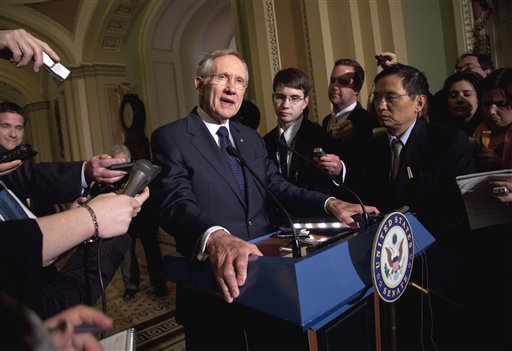WASHINGTON (AP) — In an early victory for Republicans, the Democratic Senate is voting to send President Barack Obama a GOP-drafted measure that cuts $4 billion in spending as the price for keeping the government open for an additional two weeks.
Sweeping bipartisan support is expected Wednesday for the measure, which passed the House on Tuesday by a 335-91 tally. More than 100 Democrats broke with Minority Leader Nancy Pelosi of California to support it.
“The president is encouraged by the progress Congress is making towards a short-term agreement,” White House press secretary Jay Carney said after the House vote. “Moving forward, the focus needs to be on both sides finding common ground in order to reach a long-term solution that removes the kind of uncertainty that can hurt the economy and job creation.”
Hours earlier, however, Carney had floated a trial balloon for a four- or five-week measure that would provide a more realistic time frame for what promises to be highly contentious negotiation on a follow-up bill to set spending levels through the end of the fiscal year, Sept. 30.
That balloon soon popped. “If there had been a conversation about this 10 days ago or two days ago, we might have had something to talk about,” Republican House Speaker John Boehner said. “But the fact is, we were forced to move on our own.”
The $4 billion in savings comes from some of the easiest spending cuts for Congress to make, hitting accounts that Obama already has proposed eliminating and reaping some of the money saved by earlier moves by Republicans to ban lawmakers from “earmarking” pet projects back to their districts and states.
But Republicans seized on the vote as setting a precedent for cuts of $2 billion a week — which, if extended through the end of the budget year, would match the $61 billion in cuts in a measure passed by the House last month to meet their promise of cutting federal agency operating budgets back to levels in place before Obama took office.
“Changing the culture of borrowing and spending in Washington is no small feat; but I am heartened by today’s action, and it shows that Republicans have started to make the meaningful changes that voters called for in the last election,” said House Majority Leader Eric Cantor, R-Va.
The White House has promised a veto of the bigger GOP measure, citing crippling cuts to many federal agencies and studies by economists that predict the spending cuts would harm the economy.
But the GOP won control of the House and gained seats in the Senate last fall with the backing of tea party activists demanding deep, immediate cuts in federal spending. They say that an early down payment on those cuts would send a confidence-building signal to financial markets and the business community.
Still, difficult negotiations loom between House Republicans, Senate Democrats and the White House over the full-year spending measure. It blends cuts across hundreds of programs — education, the environment, homeland security and the IRS among them — with a slew of provisions that attack clean air and clean water regulations, family planning and other initiatives.
Rep. Jared Polis, D-Colo., said the earlier measure “loads up every piece of the far-right social agenda in one bill, from restricting a woman’s right to choose to preventing government from protecting the air we breathe and the water we drink.”
The White House and many Democrats believe that the two-week time frame is too short for negotiations on the longer-term bill.
“The sooner we can agree on a long-term package of smart cuts — not reckless, arbitrary, job-destroying cuts — the sooner we can stop funding the government in disruptive two-week increments that undermine efficiency and spread economic uncertainty,” said Rep. Steny Hoyer of Maryland, ranked second in the Democratic leadership.
When it came time to vote in the House, Democrats split, 104 in favor and 85 against. The leadership was similarly divided, Hoyer supporting the legislation and Pelosi opposing it.







